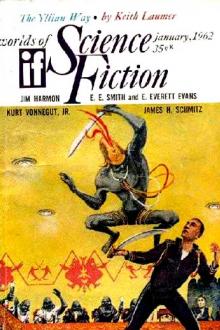Bat Wing, Sax Rohmer [top 20 books to read .txt] 📗

- Author: Sax Rohmer
Book online «Bat Wing, Sax Rohmer [top 20 books to read .txt] 📗». Author Sax Rohmer
“I passed the Guest House on my return,” I continued. “Do you know Mr. Camber?”
She looked at me in a startled way.
“No,” she replied, “I don’t. Do you?”
“I met him by chance yesterday.”
“Really? I thought he was quite unapproachable; a sort of ogre.”
“On the contrary, he is a man of great charm.”
“Oh,” said Val Beverley, “well, since you have said so, I might as well admit that he has always seemed a charming man to me. I have never spoken to him, but he looks as though he could be very fascinating. Have you met his wife?”
“No. Is she also American?”
My companion shook her head.
“I have no idea,” she replied. “I have seen her several times of course, and she is one of the daintiest creatures imaginable, but I know nothing about her nationality.”
“She is young, then?”
“Very young, I should say. She looks quite a child.”
“The reason of my interest,” I replied, “is that Mr. Camber asked me to call upon him, and I propose to do so later this morning.”
“Really?”
Again I detected the startled expression upon Val Beverley’s face.
“That is rather curious, since you are staying here.”
“Why?”
“Well,” she looked about her nervously, “I don’t know the reason, but the name of Mr. Camber is anathema in Cray’s Folly.”
“Colonel Menendez told me last night that he had never met Mr. Camber.”
Val Beverley shrugged her shoulders, a habit which it was easy to see she had acquired from Madame de Stämer.
“Perhaps not,” she replied, “but I am certain he hates him.”
“Hates Mr. Camber?”
“Yes.” Her expression grew troubled. “It is another of those mysteries which seem to be part of Colonel Menendez’s normal existence.”
“And is this dislike mutual?”
“That I cannot say, since I have never met Mr. Camber.”
“And Madame de Stämer, does she share it?”
“Fully, I think. But don’t ask me what it means, because I don’t know.”
She dismissed the subject with a light gesture and poured me out a second cup of coffee.
“I am going to leave you now,” she said. “I have to justify my existence in my own eyes.”
“Must you really go?”
“I must really.”
“Then tell me something before you go.”
She gathered up the bunches of roses and looked down at me with a wistful expression.
“Yes, what is it?”
“Did you detect those mysterious footsteps again last night?”
The look of wistfulness changed to another which I hated to see in her eyes, an expression of repressed fear.
“No,” she replied in a very low voice, “but why do you ask the question?”
Doubt of her had been far enough from my mind, but that something in the tone of my voice had put her on her guard I could see.
“I am naturally curious,” I replied, gravely.
“No,” she repeated, “I have not heard the sound for some time now. Perhaps, after all, my fears were imaginary.”
There was a constraint in her manner which was all too obvious, and when presently, laden with the spoil of the rose garden, she gave me a parting smile and hurried into the house, I sat there very still for a while, and something of the brightness had faded from the coming, nor did life seem so glad a business as I had thought it quite recently.
CHAPTER XIII. AT THE GUEST HOUSE
I presented myself at the Guest House at half-past eleven. My mental state was troubled and indescribably complex. Perhaps my own uneasy, thoughts were responsible for the idea, but it seemed to me that the atmosphere of Cray’s Folly had changed yet again. Never before had I experienced a sense of foreboding like that which had possessed me throughout the hours of this bright summer’s morning.
Colonel Menendez had appeared about nine o’clock. He exhibiting no traces of illness that were perceptible to me. But this subtle change which I had detected, or thought I had detected, was more marked in Madame Stämer than in any one. In her strange, still eyes I had read what I can only describe as a stricken look. It had none of the heroic resignation and acceptance of the inevitable which had so startled me in the face of the Colonel on the previous day. There was a bitterness in it, as of one who has made a great but unwilling sacrifice, and again I had found myself questing that faint but fugitive memory, conjured up by the eyes of Madame de Stämer.
Never had the shadow lain so darkly upon the house as it lay this morning with the sun blazing gladly out of a serene sky. The birds, the flowers, and Mother Earth herself bespoke the joy of summer. But beneath the roof of Cray’s Folly dwelt a spirit of unrest, of apprehension. I thought of that queer lull which comes before a tropical storm, and I thought I read a knowledge of pending evil even in the glances of the servants.
I had spoken to Harley of this fear. He had smiled and nodded grimly, saying:
“Evidently, Knox, you have forgotten that to-night is the night of the full moon.”
It was in no easy state of mind, then, that I opened the gate and walked up to the porch of the Guest House. That the solution of the grand mystery of Cray’s Folly would automatically resolve these lesser mysteries I felt assured, and I was supported by the idea that a clue might lie here.
The house, which from the roadway had an air of neglect, proved on close inspection to be well tended, but of an unprosperous aspect. The brass knocker, door knob, and letter box were brilliantly polished, whilst the windows and the window curtains were spotlessly clean. But the place cried aloud for the service of the decorator, and it did not need the deductive powers of a Paul Harley to determine that Mr. Colin Camber was in straitened circumstances.
In response to my





Comments (0)